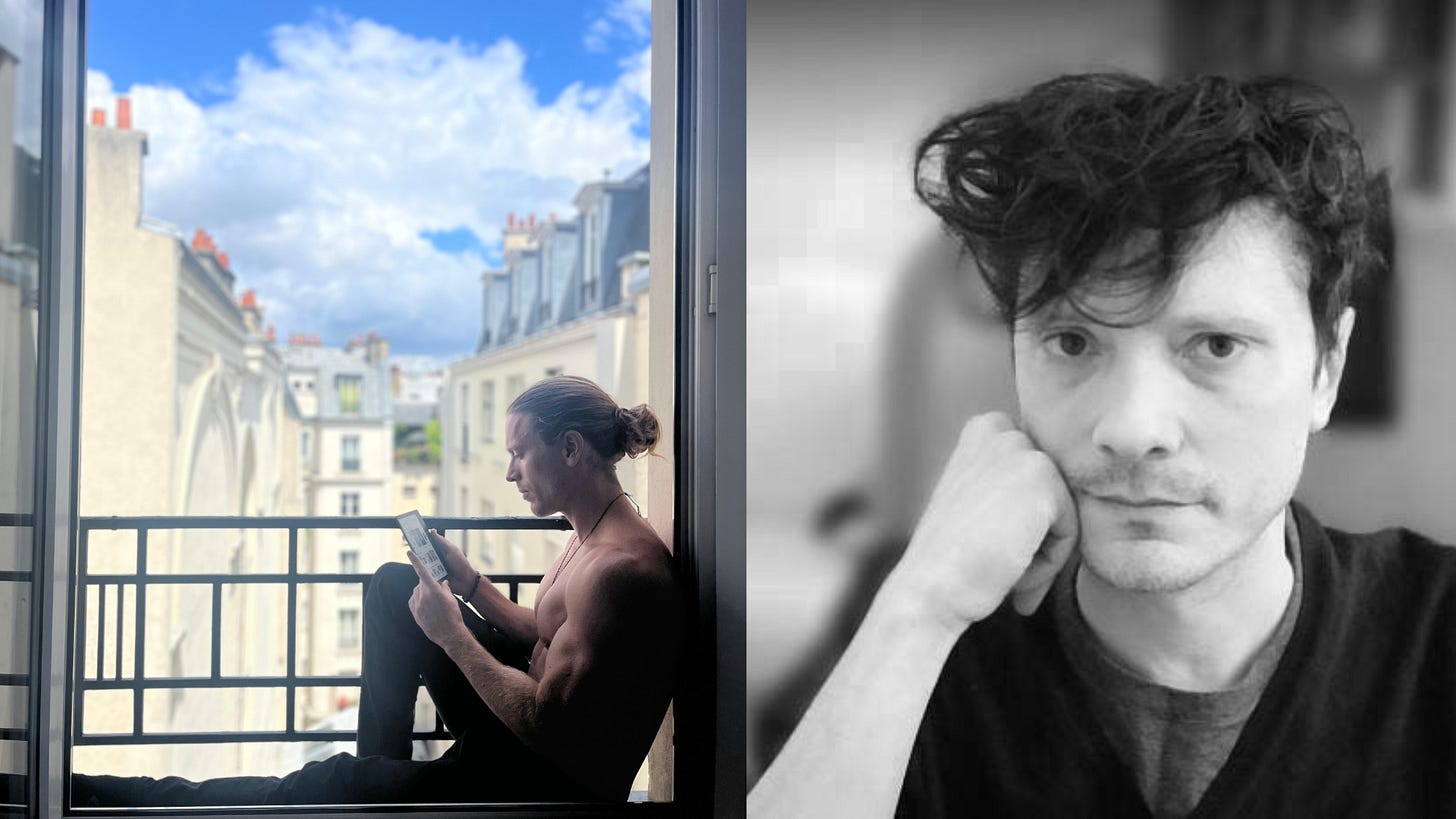Is Film School Worth It?
A Perspective from London to Vancouver with Remy Bazerque & Nolan Yuma
This week, I’m taking a break from exploring slow travel's therapeutic effects. As always, my conversations are with nomads, global citizens, language lovers, and people breaking down borders. This time, I was lucky enough to talk to a man who blurs genres, breaks borders, and adds diversity to Substack—.
Remy Bazerque, an award-winning writer/director waving frantically from the edges of the film industry, and I, an inescapably foreign writer and recovering actor, discuss our Film School Experiences.
Remy attended the National Film and Television School in the UK, which is consistently ranked one of the top film schools in the world. I went to Vancouver Film School, which is inconsistently ranked as one of the best film schools in North America (which, according to Hollywood apocalyptic movies, is the world—that, and shot of the Eiffel Tower).
Although we both ended up with different experiences, the core of our advice proves useful to anyone considering film school, especially those who are “Green.”
Nolan: Although I fell in love with non-linear narratives when studying Christopher Nolan’s Memento and Tarantino’s Pulp Fiction at Vancouver Film School, in this case, I will start from the beginning.
When I finished high school, I knew exactly what I wanted to do—become a screenplay writer, producer, and actor. Since I wanted to travel while writing scripts, feature writing interested me more than the TV world. Getting up to trouble in Amsterdam while writing dark comedies enjoyed by generations to come? Yes, please.
Shooting for the moon and ending up among the stars was my naive 18-year-old mindset. I was ambitious (desperate?), and the sales team at VFS could smell that. They have an application process that makes people feel like they must be good enough to get in. In reality, you need 20 grand.
Also, at 18, 4 years seems like a long time, so when they said their intensive 1-year diploma program was incomparably better than a 4-year degree related to film, I believed them. Several years later, I ended up going to university to study psychology and English (the opposite of what most of my VFS classmates in their 30s did) and realized how much better off I would have been financially and intellectually if I had gone straight to university. I also realized I could have learned about film while getting paid.
Still, before I get into all of that, I'm curious to know what your beginning was like. Did you know what you wanted? What made you choose film school over Uni or just diving into the film world jobs right away?
Remy: I came to film after a few years as an actor, mainly a theatre one. My pivot to film came with me meeting storytelling in drama school. I started writing plays, and then I shot a short with my friends. This was the short that allowed me to get into the National Film and Television School in the UK—a highly selective state-funded film school with a focus on practical learning. I could make four films during the time of my master's degree at NFTS, and that was my primary motivation to get into film school. Looking back, I think my motivation, 'learn and make four shorts,' was the wrong one when put in the context of that school. I think I would have been better off going on with clear-cut ambitions of what I wanted to get out of the process—be it a project, an agent, or something concrete. I think had I not gotten into this school, I would have probably gone my own path and dived into film jobs. How was film school for you? Did you get what you wanted out of it?
Nolan: The fact it’s state-funded probably makes all the difference. VFS is private, and that results in putting business before education. This could bring us into a whole new discussion as to whether or not educational institutions should act like businesses, but in my case, I definitely did not get what I wanted out of it.
Aside from a few instructors who were there for the love of teaching, most VFS instructors were people struggling to make ends meet themselves. Of course, we can learn just as much from people who didn't gain financial success, but as an eighteen-year-old who looks like a Baywatch lifeguard, most instructors didn't take me seriously. One professor wrote, “Wow, I didn’t expect your script doctoring to be so well done.”
So, I did learn a lot about scriptwriting, copywriting, script doctoring, how to pitch, and so on, but nothing beyond what you can learn in a few books and YouTube videos. I hoped that VFS would put me in contact with the right people or at least leave me with some shorts to add to a resume, but we only completed two projects, which were amateur at best. I didn't feel like the instructors gave us any guidance in the actual projects.
If I could do it all over again, I would have chosen university and stretched my four-year degree over six years while I worked in the industry. I didn't even know stretching a degree was possible when I decided to go to VFS.
However, film school threw me into the world of broken dreams/reality. Most of my classmates were in their late twenties to mid-forties. People who had already gone to university, dived into various careers, gone through divorces, dealt (or were dealing) with addiction, travelled, lost themselves, and lived a life beyond academia.
I was introduced to the margins of society that the academic world is scared to touch. The money-laundering restaurant owner, the dealer with diplomatic immunity, the escorts holding billionaires’ secrets, the homeless people with more wisdom and stories to share than the gurus—that's the part of film school I wouldn't trade for the world.
Yet, I dove deeper into that world without film school. Once I started acting in commercials and TV, selling random products, modelling, and doing the desperate odd job that corrupts your soul but gives you enough cash to make it worry-free to last-minute auditions, I knew enough about those who control the strings.
I don't hate that world. It is our world. It’s full of power dynamics, psychopaths, egos, and the artists that make it all worth it. I wish I learned all about it while getting paid from the start instead of wasting money on VFS, but I think the final result would have been the same—an escape to university where the darkness of humanity is discussed rather than lived.
But I'm curious about what you said about clear-cut ambitions. How would you have navigated film school differently if your objective was to get an agent or something concrete? And do you think you would need film school if you had your goals clearly defined?
Remy: Looking at it with hindsight, I think had my goal been more concrete, I would have been a bit more rational in what I did and specifically the order I did things. I would have kept my 'best' idea for the graduation film, for instance, instead of wasting it on a side project. I think I would have been a bit more proactive in developing working relationships there. But I was very green, unlike the majority of my fellow students, so for me, the learning experience was essential. The NFTS is specialised, so it meant that for each year, there would be 8 directors, 8 producers, 8 DOPs, etc. I was one of the lucky ones who got into the directing course, and despite probably not milking the opportunity like I should have, I've learned a lot. Do I think I needed film school? Well, it's hard to say. I think you can learn everything that you learn there on set. Although it's easy to get pigeonholed in small roles, especially when you're good at them, the transition from a set role to, say, a director is a hard one. What about you Nolan, your time in film school seems to have been painful. Why do you think a longer, more serious course would have been so different? Every art school has this 'broken dream' vibe to it to some extent. Why does that make you react so strongly?
Nolan: If I react strongly, it’s probably because I fell for the sales pitches. Again, this ties into not going in “green.” I wish I had more experience under my belt to sniff out the BS. Sure, VFS ranks highly on some sites, but I now know they don't add any more value than the profs at university. In fact, sometimes, the local universities have the same instructors as at VFS.
Stretching out a university degree would have been different because it’s more interdisciplinary. Plus, you end up with a degree, which is an ever-so-slightly more useful piece of paper than a diploma.
Yet, there’s no use in regret or wishing I had done things differently. If I could give two cents to those fresh out of high school, it would be “Don’t rush.” Four years might seem like forever, but ten years from now, four years will seem like a blink of an eye. Even if you know exactly what you want, spend your time learning as much as you can and experimenting. After all, that’s what art, and arguably life, is all about.
If you could advise someone fresh out of high school, what would it be? And would it differ from the advice you’d give an adult who finally decided to switch directions and study what they are passionate about?
Remy: I think my advice for someone fresh out of high school would be to try different things quite fast and get a taste before committing fully. That would be very different from an adult changing path because often, the adult would have had time to think about things and figure out what they truly wanted to do. In general, I would definitely recommend film school, as long as one understands that nothing in the art world guarantees a job, least of all a degree.
The fact that studying art won’t guarantee you a job, money, or sanity isn’t news. However, we hope our experiences have given you insight into which path is best for you. If you have any further questions, don’t hesitate to comment.
Aside from acting, directing, and writing, Remy and I also love idioms. To learn more French, check out the French Expressions section on Enfant Terrible. You can also learn more about the Spanish culture and language from Errores de un Guiri in the Born Without Border’s Language Learning section.
Subscribe to Enfant Terrible. Spleens, sins, and dad-related exhaustings from an award-winning writer/director, currently avoiding work on a screenplay.
Subscribe to Born Without Borders. Stories and advice for nomads, global citizens, third-culture kids, or anyone else who feels inescapably foreign. Salir de las fronteras que impone tu mente.






